Bamboo Countertops Buyer's Guide
The popularity of bamboo countertops is on the rise as renewable, eco-friendly materials are hitting the mainstream and homeowners are always on the look-out for new or unique materials that will give their kitchen design that extra spark of style.
Of course, you want function in addition to style so it’s important to first learn all the pros & cons of bamboo countertops before putting your money down as no countertop is perfect. Let’s review all the key considerations….
oN THIS PAGE
How is a Bamboo Countertop Made?
Bamboo is incredibly versatile. Bamboo is used throughout the world for many things, such as medicinal purposes, food, clothing, textiles, flooring, and countertops.
Bamboo countertops are made the same way that plywood is made. Sheets of bamboo are bound together under pressure with adhesive to form panels or boards. These boards can then be cut up and reconfigured to display certain grain patterns.
Maybe that doesn’t sound too sexy but it works and the end result looks wonderful. In reality, the process is very similar to how wood countertops are made.
Bamboo is not wood, though... it's grass! But it has similar properties to wood, which makes it a great material for countertops.
Both are hard materials and have fibrous structural tissue. Like wood, bamboo also expands in different temperatures and levels of humidity which must be considered for maintenance.
Pros & Cons of Bamboo Countertops
Bamboo countertops may be the right choice for you, but no matter what types of countertops you are interested in purchasing, it is vital to first consider how you intend to use it vs. the characteristics and maintenance requirements of that surface.
For instance, kitchen countertops get far more use and abuse than bathroom countertops or even a kitchen island (unless this is the primary area of use).
Thus, for a kitchen countertop, you generally want a durable surface that is highly-resistant to stains, heat, scratches, and acids without being too much trouble to maintain.
Given that bamboo may not be the best choice for a primary use area in the kitchen unless you are set on wood countertops and/or an eco-friendly material and you’re willing to put in the extra care.
Check out these bamboo countertops pros & cons to decide for yourself.
What are the Pros of a Bamboo Countertop?
- Environmentally friendly, green countertop material
- Anti-bacterial properties
- Easy to refinish by sanding and resealing
- Durable, hard, and strong.
- Reasonable cost
- Uniquely attractive appearance
Bamboo is naturally resistant to bacteria and will not allow mold or mildew to grow either.
In case a scratch occurs, every type of bamboo countertop is easy to re-sand and re-seal. If you do not want to hire a professional to do it, it is easy to do it yourself.
Bamboo is durable and hard. The hardest types of bamboo countertops are the vertical grain, end grain, and strand. Some bamboo (such as the Moso variety) can be harder than woods such as maple or oak.
If you are interested in going green or being eco-friendly, bamboo is the perfect way to go. Bamboo is a natural, renewable resource.
The bamboo that is most commonly used for countertops is called Moso. This type of bamboo takes between 4-7 years to grow. This is much faster than other words used for construction. The Moso bamboo will also grow back because the roots are not harvested.
What are the Cons of a Bamboo Countertop?
- Not heat resistant
- Not stain resistant
- Not water resistant
- Requires sealant
- Easily damaged by scratching, chipping, and denting
- Visible seams
- Limited color options
That’s a tough list of cons. Bamboo is durable in that it will last a long time with proper care, but it can be damaged.
Bamboo countertops are not heat resistant, so you must be proactive about not placing hot items on the countertop directly or risk damaging the finish.
For perspective, this is also true for laminate, Corian, and even quartz countertops.
Use trivets, hot pads, or a cooling rack to avoid scorching the surface finish, the bamboo itself or the glues used in making the countertop.
Speaking of glue, it’s okay that bamboo countertops are a laminated surface made by gluing together thin sheets of bamboo. Many countertop materials are made with glues and resins.
However, the glues must be food-safe and free of formaldehyde. The manufacturers should provide you with all the information needed about this. Just don’t buy from any place that is not transparent regarding the chemicals used during manufacturing.
The countertop can scratch, chip, or dent. Precaution should be taken when handling heavy objects such as large soup cans or pots. Along with being chipped, it can also be stained by certain liquids or foods.
Depending on the size of your kitchen island, there may be a seam or multiple seams because of the size of the slabs. This isn’t necessarily a con, but many people do not like seeing seams.
Watch out for spills and stains. Stains cannot really be removed by “cleaning”. Typically the area will need to be refinished by sanding away the stain and resealing.
Sealing Bamboo Countertops
Pay attention to wet areas as bamboo countertops are not completely water resistant. Make sure that the surface is well-sealed, particularly around the sink.
Multiple applications of an oil or sealer are necessary to ensure that there is no water damage to the countertop.
Sealers, oils, and coatings used on wood can be used on bamboo too, although, you’ll want a sealer that is safe for food-prep surfaces.
Mineral oil and/or Beeswax (we recommend Daddy Van's) are the best for sealing bamboo countertops. These are food safe and effective but must be periodically reapplied.
Or you may consider a mineral oil + beeswax combo product.
Tung Oil is a great option too. It' an excellent oil for bamboo countertops that provides an exceptionally pleasing finish. However, it is made from nuts and may provoke an allergic reaction (if you are allergic to nuts).
Different Styles of Bamboo Countertops
Bamboo countertops all have a similar look, but a few options are available to meet personal taste, style, finish, and durability needs.
Most bamboo will be a light blonde color, but darker colors can be achieved via “carbonization”.
Edges are usually squared or rounded but can have inset patterns. Likewise, the surface can have inset patterns or design but that is a premium option from an experienced bamboo craftsman.
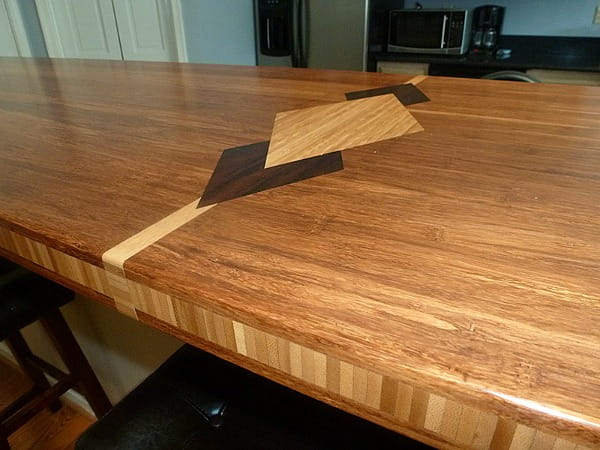 Image Source: Custom Wood Countertops
Image Source: Custom Wood CountertopsThe grain type is determined by how the bamboo sheets are oriented when assembled or laminated into a countertop. And the grain will determine how durable the surface will be.
Vertical, end, and strand grain are the hardest and most resistant to damage. Flat grain is less durable but shows off the unique pattern of the bamboo nodes.
Vertical Grain
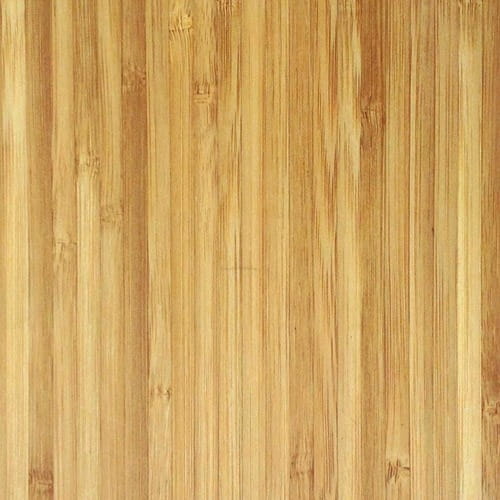
This is when the bamboo pieces are glued together vertically, creating a striped pattern.
It's a type of bamboo butcher block countertop.
You will definitely be able to tell that the countertop is made of bamboo and not of another type of wood with this style as the “nodes” or “knuckles” are still visible.
End Grain
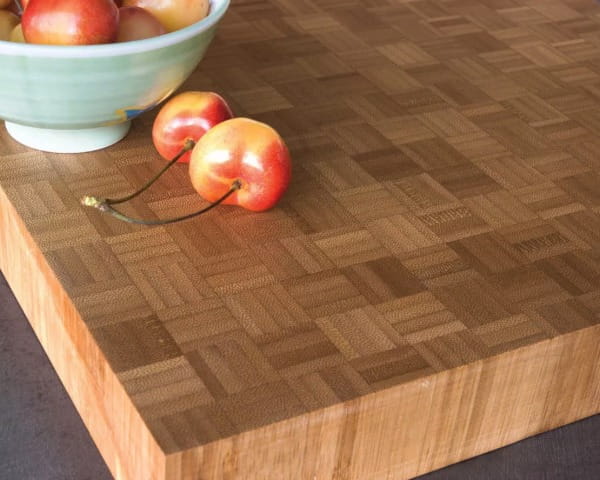 Image Source: Teragren - bamboo countertops end grain parquet butcher block
Image Source: Teragren - bamboo countertops end grain parquet butcher blockThis is also known as end-grain butcher block or parquet butcher block. This orientation will have the same look as a traditional wood butcher block countertop.
The end grain style is created by cutting off the end of the bamboo strips and then sealing them together with a non-toxic adhesive. The rectangle shaped ends are then applied in a face-up/face-down pattern.
This bamboo butcher block type is great for withstanding cutting because it does not show scratches very easily due to the pattern of the bamboo strips.
Stranded Woven
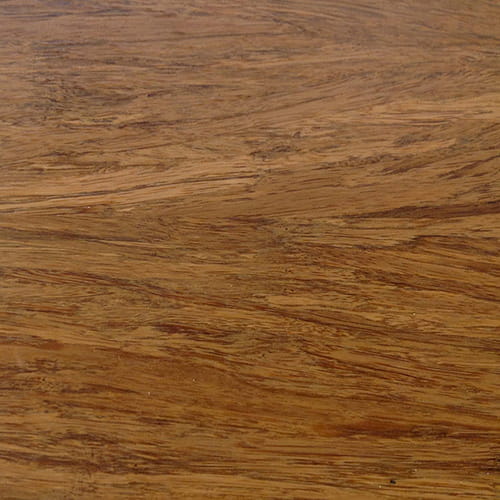 Image Source: Brightfields
Image Source: BrightfieldsThe strand woven style is created by using “strands” of bamboo instead of cut strips. The surface is made by combining the strands with adhesive and pressing together under high-pressure. Like horizontal grain, stand woven looks a lot like wood as well.
Flat Grain
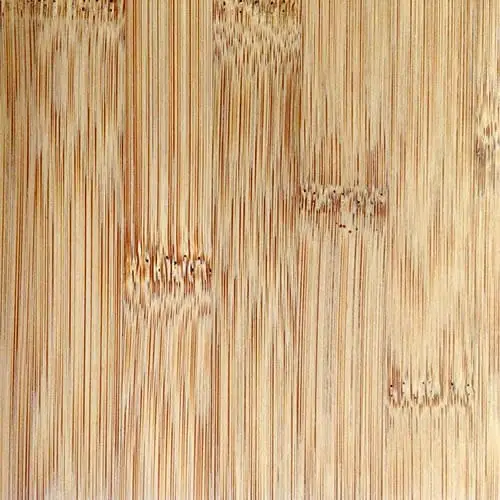
This style is also known as horizontal or “face” grain and is created when the bamboo pieces are joined with their edges together and then flipped so that the underside is face-up. The nodes of the bamboo stalk are shown with this style which reveals the distinctive character of this species of wood countertop.
Bamboo Countertops Costs
Bamboo countertops are not cheap countertops but can be relatively less expensive than others.
- Bamboo countertops cost between $40 and $100 per square foot which is similar to granite or marble when considering the “average” range.
Of course, many variables influence the total cost for any countertop material, hence the wide range. High-end granite countertops, marble, and quartz can run well over $100 sq. ft. in some cases.
Bamboo does average in the same price range as other hardwoods. It is important to “shop around” and compare pricing to find what fits your needs the best.
The price will largely depend on the quality of the bamboo but installations cost can vary as well.
For example, a 50 sq. ft. countertop will cost…
- On average, from $2000 to $3000.
- Affordable, lower-quality run $1500 to $2000.
- Premium bamboo countertops cost $2600 to $4000
Bamboo Countertops Care and Maintenance
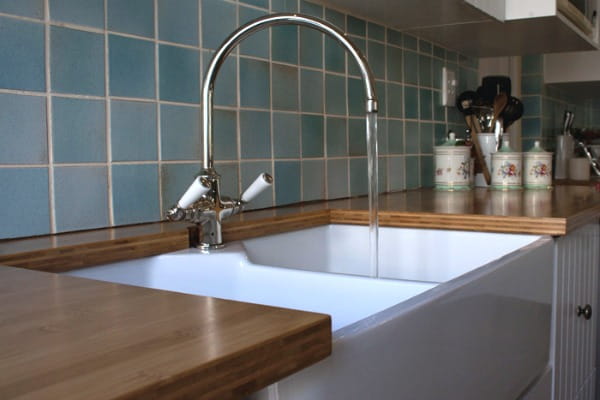 Image Source: Brightfields
Image Source: BrightfieldsBelow are tips on how to clean bamboo countertops and things you need to remember to keep your bamboo in tiptop condition.
- Wipe the counters down on a regular basis with a damp cloth or sponge.
- Use an all-purpose and non-abrasive cleaner.
- Puracy Cleaner is our top pick. It's a natural, non-toxic, and biodegradable cleaner.
- Never use harsh chemicals or ammonia.
- Wipe up spills quickly as stains can occur (sealing will help a lot).
- Tung Oil protects the bamboo from any moisture that may seep into the pores while it provides a soft finish (but derived from nuts and can cause an allergic reaction).
- Mineral oil or Beeswax are good for sealing and finishing. If using a paste, be sure to follow the grain. Apply beeswax at least once a month.
Bamboo countertop care, cleaning, sealing, and maintenance does require a bit more effort than other countertop materials. But the procedures are simple and it's worth it for the unique beauty and warmth bamboo adds to your kitchen design and home.
To Summarize
Bamboo can make a great countertop with properties similar to wood countertops but proper maintenance is key.
Benefits
It’s a natural, renewable resource and eco-friendly countertop material resistant to bacteria, mold, and mildew.
With a pleasing color and pattern, it adds a warm glow to bath and kitchen design.
Cost fall in the mid-range compared to other countertop materials like granite and quartz.
Bamboo countertops can be refinished to like new condition.
Bamboo is durable and can last but has some weaknesses.
Bamboo is not heat, stain, or scratch resistant (end grain will resist and hide damage the best).
It’s a bit high-maintenance and requires regular sealing to guard against stains and water intrusion.
Color options are limited and seams may be visible.
For the above reasons, bamboo is best suited for a bathroom countertop or lower use area in the kitchen… perhaps a kitchen island.



